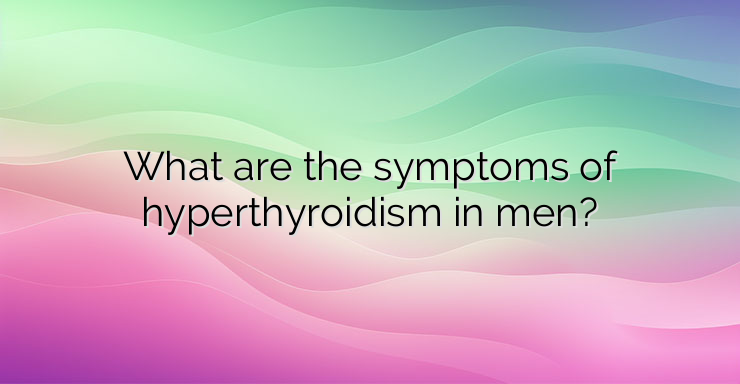What is hyperthyroidism? Hyperthyroidism (Thyrotoxicosis) is a condition in which the thyroid gland produces more hormones than the body needs. The hormones that are synthesized by the thyroid gland affect the functioning of most organs. Hyperthyroidism can harm heart health, muscle health, semen quality if not treated effectively. The opposite of hyperthyroidism is the more common hypothyroidism, when the gland does not produce enough hormones for the body’s needs. Women are 2 to 10 times more likely than men to develop an overactive thyroid gland. Men and women share many of the main symptoms of hyperthyroidism, but there are some symptoms that are unique to men. What are the causes of hyperthyroidism in men? A condition known as Graves’ disease is the most common cause of hyperthyroidism in men, although women are also prone to developing this autoimmune disorder. The development of Graves’ disease means that the immune system mistakenly attacks a healthy thyroid gland, causing it to produce too much thyroid hormone. The condition usually occurs between the ages of 30 and 50, although it can occur at any age. Other possible causes of hyperthyroidism in men include: Thyroid nodules, growths that form in the gland; Plummer’s disease; Thyroiditis – inflammatory diseases affecting the thyroid gland; Too much iodine intake through medication or diet What are the symptoms of hyperthyroidism in men? There are many symptoms of hyperthyroidism. Some, such as difficulty falling asleep, may not be noticeable. While others, such as an abnormally fast heart rate (even at rest), can quickly attract attention. Other common symptoms of hyperthyroidism include: Unexpected weight loss, even when food consumption and appetite remain unchanged; Irregular pulse; Heart palpitations; Nervousness and irritability; Fatigue; Tremor (shaking of fingers and hands); Sweating; Increased sensitivity to heat and / or cold; Accelerated peristalsis, accelerated, faster bowel movements; Muscle weakness; Hair thinning Bibliography: National Institute of Diabetes and Digestive and Kidney Diseases. Graves’ disease. National Institute of Diabetes and Digestive and Kidney Diseases. Hyperthyroidism.


Leave a Reply